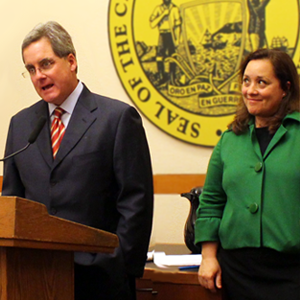City attorney seeks records in case showing how widespread and blatant the disregard for short-term rental rules is

By Tim Redmond
SEPTEMBER 9, 2015 – The blatant disregard of the city’s laws against short-term rentals, and the inability of city planning officials to do anything about it, was put in full public view this week when City Attorney Dennis Herrera filed a series of subpoenas to demand records of an apparently illegal hotel site operating out of a residential complex on Mission St.
The giant residential buildings at 1188 and 1190 Mission are owned by Angelo Sangiacamo’s Trinity Properties.
According the Herrera’s office, Trinity leased 16 different units – all covered by rent control, all legally limited to residential use – to a company called LUMI Worldwide and its operator, Catherine Zhang.
Zhang was then renting the apartments out as short-term tourist rooms, as part of something called the “Soma Suites Hotel.”
From the city attorney’s press office:
Apart from recognizing the obvious—that a single individual can’t simultaneously reside in 16 apartments—Trinity’s management knew that Zhang was subleasing the rent-controlled units, according to Herrera, in apparent violation of its own lease provisions expressly forbidding subletting, and its development agreement with the city.
The permit that allowed Sangiacamo to rebuild and expand the property mandated that he preserve 360 units of rent-controlled housing. Even the newer units can’t legally be leased as hotel rooms.
Herrera has been looking into the situation for months, but says the landlord and his attorneys have been less than cooperative.
In a letter to Sangiacamo’s attorney, Andrew Wiegel, Herrera notes that a simple request for information
was instead met “with obfuscation and deflection of responsibility … I find your responses on behalf of your clients particularly difficult to accept given the nature and history of the properties.”
The subpoenas seek information about the lease agreements between Trinity and Zhang, a company called 1169 Market LP, and details of lease agreements and occupancy records for all of the rent-controlled units in the buildings.
The idea that one of the city’s largest landlords could directly defy the law against short-term rentals (even the city’s current lax law prohibits a single owner from renting out multiple units), over a period of years, with little apparent fear of getting caught says volumes about why short-term rentals need tighter regulation.
“For many years, when the interests of tourists and residents have clashed, the city has sided with its residents,” Matt Dorsey, a member of the Democratic County Central Committee, told me.
Since February, when the current STR law went into effect, the pendulum has swung in the direction of tourists.
Prop. F on the November ballot would more tightly restrict Airbnb-style rentals, and would put the onus on the hosting companies to ensure that all listed units are legally registered with the city. It would also allow neighbors to go to court and sue if the city failed to crack down in illegal units.
That’s the provision Airbnb’s half-million (so far) campaign against Prop. F is focusing on: Neighbors suing neighbors. But the city so far hasn’t demonstrated that it has the staff or the ability to go after the thousands of possibly illegal units on the market every day.
The 1188 Mission Street case is particularly blatant, but the City Attorney’s Office doesn’t have the staff to sue very single violator.
Besides, as Dorsey put it, “Until February of this year, every single person who was doing this (renting out rooms on Airbnb) was violating city law. So I think there are reasons for people to worry that they won’t all suddenly come into compliance.”



